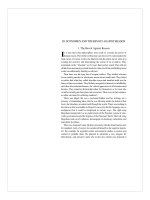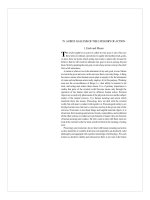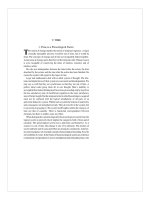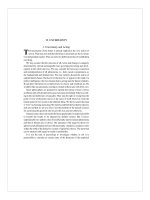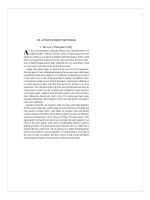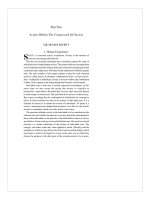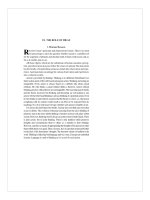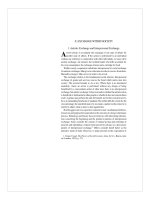Luận án kinh tế - "Human and action" - Chapter 5 pot
Bạn đang xem bản rút gọn của tài liệu. Xem và tải ngay bản đầy đủ của tài liệu tại đây (21.74 KB, 6 trang )
V. TIME
1. Time as a Praxeological Factor
T
HE notion of change implies the notion of temporal sequence. A rigid,
eternally immutable universe would be out of time, but it would be
dead. The concepts of change and of time are inseparably linked together.
Action aims at change and is therefore in the temporal order. Human reason
is even incapable of conceiving the ideas of timeless existence and of
timeless action.
He who acts distinguishes between the time before the action, the time
absorbed by the action, and the time after the action has been finished. He
cannot be neutral with regard to the lapse of time.
Logic and mathematics deal with an ideal system of thought. The rela-
tions and implications of their system are coexistent and interdependent. We
may say as well that they are synchronous or that they are out of time. A
perfect mind could grasp them all in one thought. Man’s inability to
accomplish this makes thinking itself an action, proceeding step by step from
the less satisfactory state of insufficient cognition to the more satisfactory
state of better insight. But the temporal order in which knowledge is acquired
must not be confused with the logical simultaneity of all parts of an
aprioristic deductive system. Within such a system the notions of anteriority
and consequence are metaphorical only. They do not refer to the system, but
to our action in grasping it. The system itself implies neither the category of
time nor that of causality. There is functional correspondence between
elements, but there is neither cause nor effect.
What distinguishes epistemologically the praxeological system from the
logical system is precisely that it implies the categories both of time and of
causality. The praxeological system too is aprioristic and deductive. As a
system it is out of time. But change is one of its elements. The notions of
sooner and later and of cause and effect are among its constituents. Anterior-
ity and consequence are essential concepts of praxeological reasoning. So is the
irreversibility of events. In the frame of the praxeological system any reference
to functional correspondence is no less metaphorical and misleading than is the
reference to anteriority and consequence in the frame of the logical system.
1
2. Past, Present, and Future
It is acting that provides man with the notion of time and makes him aware
of the flux of time. The idea of time is a praxeological category.
Action is always directed toward the future; it is essentially and neces-
sarily always a planning and acting for a better future. Its aim is always to
render future conditions more satisfactory than they would be without the
interference of action. The uneasiness that impels a man to act is caused by
a dissatisfaction with expected future conditions as they would probably
develop if nothing were done to alter them. In any case action can influence
only the future, never the present that with every infinitesimal fraction of a
second sinks down into the past. Man becomes conscious of time when he
plans to convert a less satisfactory present state into a more satisfactory
future state.
For contemplative meditation time is merely duration, “la durée pure,
dont l’écoulement est continu, et où l’on passe, par gradations insensibles,
d’un etat a l’autre: Continuité réellement vécue.”
2
The “now” of the present
is continually shifted to the past and is retained in the memory only.
Reflecting about the past, say the philosophers, man becomes aware of
time.
3
However, it is not recollection that conveys to man the categories of
change and of time, but the will to improve the conditions of his life.
Time as we measure it by various mechanical devices is always past, and
time as the philosophers use this concept is always either past or future. The
present is, from these aspects, nothing but an ideal boundary line separating
the past from the future. But from the praxeological aspect there is between
the past and the future a real extended present. Action is as such in the real
present because it utilizes the instant and thus embodies its reality.
4
Later
retrospective reflection discerns in the instant passed away first of all the
100 HUMAN ACTION
1. In a treatise on economics there is no need to enter into a discussion of the
endeavors to construct mechanics as an exiomatic system in which the concept
of function is substituted for that of cause and effect. It will be shown later that
axiomatic mechanics cannot serve as a model for the treatment of the economic
system. Cf. below, pp. 353-357.
2. Henri Bergson, Matière et mémoire (7th ed. Paris, 1911), p. 205.
3. Edmund Husserl, “Vorlesungen zur Phänomenologie des inneren
Zeitbewusstseins,” Jahrbuch Fü Philosophie und Phänomenologische
Forschung, IX (1928), 391ff.; A. Schütz, loc cit., pp. 45 ff.
4. "Ce que j’appelle mon présent, c’est mon attitute vis-à-vix de l’avenir
immédiat, c’est action imminente." Bergson, op. cit., p. 152.
action and the conditions which it offered to action. That which can no longer
be done or consumed because the opportunity for it has passed away,
contrasts the past with the present. That which cannot yet be done or
consumed, because the conditions for undertaking it or the time for its
ripening have not yet come, contrasts the future with the past. The present
offers to acting opportunities and tasks for which it was hitherto too early
and for which it will be hereafter too late.
The present qua duration is the continuation of the conditions and
opportunities given for acting. Every kind of action requires special
conditions to which it must be adjusted with regard to the aims sought.
The concept of the present is therefore different for various fields of
action. It has no reference whatever to the various methods of measuring
the passing of time by spatial movements. The present encloses as much
of the time passed away as still is actual, i.e., of importance for acting.
The present contrasts itself, according to the various actions one has in
view, with the Middle Ages, with the nineteenth century, with the past
year, month, or day, but no less with the hour, minute, or second just
passed away. If a man says: Nowadays Zeus is no longer worshipped, he
has a present in mind other than that the motorcar driver who thinks: Now
it is still too early to turn.
As the future is uncertain it always remains undecided and vague how
much of it we can consider as now and present. If a man had said in 1913:
At present—now—in Europe freedom of thought is undisputed, he would
have not foreseen that this present would very soon be a past.
3. The Economization of Time
Man is subject to the passing of time. He comes into existence, grows,
becomes old, and passes away. His time is scarce. He must economize it as
he economizes other scarce factors.
The economization of time has a peculiar character because of the
uniqueness and irreversibility of the temporal order. The importance of these
facts manifests itself in every part of the theory of action.
Only one fact must be stressed at this point. The economization of time
is independent of the economization of economic goods and services. Even
in the land of Cockaigne man would be forced to economize time, provided
he were not immortal and not endowed with eternal youth and indestructible
health and vigor. Although all his appetites could be satisfied immediately
TIME 101
without any expenditure of labor, he would have to arrange his time
schedule, as there are states of satisfaction which are incompatible and
cannot be consummated at the same time. For this man, too, time would be
scarce and subject to the aspect of sooner and later.
4. The Temporal Relation Between Actions
Two actions of an individual are never synchronous; their temporal
relation is that of sooner and later. Actions of various individuals can be
considered as synchronous only in the light of the physical methods for the
measurement of time. Synchronism is a praxeological notion only with
regard to the concerted efforts of various acting men.
5
A man’s individual actions succeed one another. They can never be
effected at the same instant; they can only follow one another in more or less
rapid succession. There are actions which serve several purposes at one
blow. It would be misleading to refer to them as a coincidence of various
actions.
People have often failed to recognize the meaning of the term “scale
of value” and have disregarded the obstacles preventing the assumption
of synchronism in the various actions of an individual. They have
interpreted a man’s various acts as the outcome of a scale of value,
independent of these acts and preceding them, and of a previously
devised plan whose realization they aim at. The scale of value and the
plan to which duration and immutability for a certain period of time were
attributed, were hypostatized into the cause and motive of the various
individual actions. Synchronism which could not be asserted with regard
to various acts was then easily discovered in the scale of value and in the
plan. But this overlooks the fact that the scale of value is nothing but a
constructed tool of thought. The scale of value manifests itself only in
real acting; it can be discerned only from the observation of real acting.
It is therefore impermissible to contrast it with real acting and to use it
as a yardstick for the appraisal of real actions.
It is no less impermissible to differentiate between rational and allegedly
irrational acting on the basis of a comparison of real acting with earlier drafts
and plans for future actions. It may be very interesting that yesterday goals
were set for today’s acting other than those really aimed at today. But
102 HUMAN ACTION
5. In order to avoid any possible misunderstanding it may well be expedient
to emphasize that this theorem has nothing at all to do with Einstein’s theorem
concerning the temporal relation of spatially distant events.
yesterday’s plans do not provide us with any more objective and nonarbi-
trary standard for the appraisal of today’s real acting than any other ideas
and norms.
The attempt has been made to attain the notion of a nonrational action by
this reasoning: If a is preferred to b and b to c, logically a should be preferred
to c. But if actually c is preferred to a, we are faced with a mode of acting
to which we cannot ascribe consistency and rationality.
6
This reasoning
disregards the fact that two acts of an individual can never be synchronous.
If in one action a is preferred to b and in another action b to c, it is, however
short the interval between the two actions may be, not permissible to
construct a uniform scale of value in which a precedes b and b precedes c.
Nor is it permissible to consider a later third action as coincident with the
two previous actions. All that the example proves is that value judgments
are not immutable and that therefore a scale of value, which is abstracted
from various, necessarily nonsynchronous actions of an individual, may be
self-contradictory.
7
One must not confuse the logical concept of consistency (viz., absence
of contradiction) and the praxeological concept of consistency (viz., con-
stancy or clinging to the same principles). Logical consistency has its place
only in thinking, constancy has its place only in acting.
Constancy and rationality are entirely different notions. If one’s val-
uations have changed, unremitting faithfulness to the once espoused
principles of action merely for the sake of constancy would not be
rational but simply stubborn. Only in one respect can acting be constant:
in preferring the more valuable to the less valuable. If the valuations
change, acting must change also. Faithfulness, under changed conditions,
to an old plan would be nonsensical. A logical system must be consistent
and free of contradictions because it implies the coexistence of all its
parts and theorems. In acting, which is necessarily in the temporal order,
there cannot be any question of such consistency. Acting must be suited
to purpose, and purposefulness requires adjustment to changing condi-
tions.
Presence of mind is considered a virtue in acting man. A man has presence
of mind if he has the ability to think and to adjust his acting so quickly that
TIME 103
6. Cf. Felix Kaufmann, “On the Subject-Matter of Economic Science,”
Economica, XIII, 390.
7. Cf. P.H. Wicksteed, The Common Sense of Political Economy, ed. Robbins
(London, 1933), I, 32 ff.; L. Robbins, An Essay on the Nature and Significance
of Economic Science (2d ed. London, 1935), pp. 91 ff.
the interval between the emergence of new conditions and the adaptation of
his actions to them becomes as short as possible. If constancy is viewed as
faithfulness to a plan once designed without regard to changes in conditions,
then presence of mind and quick reaction are the very opposite of constancy.
When the speculator goes to the stock exchange, he may sketch a definite
plan for his operations. Whether or not he clings to this plan, his actions are
rational also in the sense which those eager to distinguish rational acting
from irrational attribute to the term “rational.” This speculator in the course
of the day may embark upon transactions which an observer, not taking into
account the changes occurring in market conditions, will not be able to
interpret as the outcome of constant behavior. But the speculator is firm in
his intention to make profits and to avoid losses. Accordingly he must adjust
his conduct to the change in market conditions and in his own judgment
concerning the future development of prices.
8
However one twists things, one will never succeed in formulating the
notion of “irrational” action whose “irrationality” is not founded upon an
arbitrary judgment of value. Let us suppose that somebody has chosen to act
inconstantly for no other purpose than for the sake of refuting the praxeo-
logical assertion that there is no irrational action. What happens here is that
a man aims at a peculiar goal, viz., the refutation of a praxeological theorem,
and that he accordingly acts differently from what he would have done
otherwise. He has chosen an unsuitable means for the refutation of praxeol-
ogy, that is all.
104 HUMAN ACTION
8. Plans too, of course, may be self-contradictory. Sometimes their
contradictions may be the effect of mistaken judgment. But sometimes such
contradictions may be intentional and serve a definite purpose. If, for instance,
a publicized program of a government or a political party promises high prices
to the producers and at the same time low prices to the consumers., the purpose
of such an espousal of incompatible goals may be demagogic. Then the program,
the publicized plan, is self-contradictory; but the plan of its authors who wanted
to attain a definite end through the endorsement of incompatible aims and their
public announcement is free of any contradiction.


